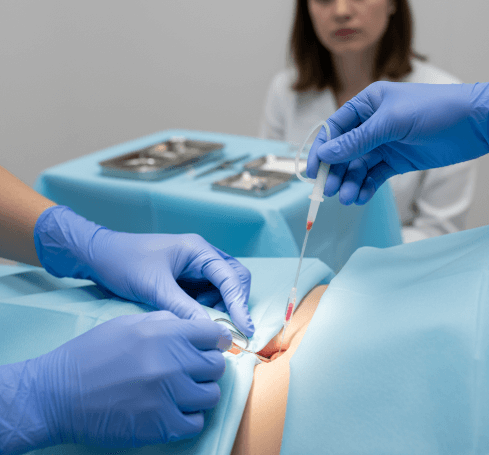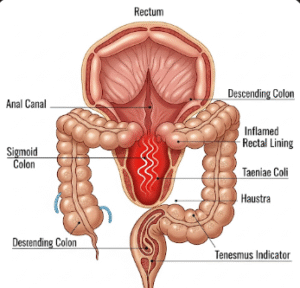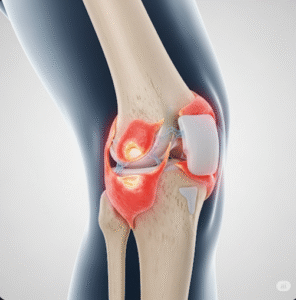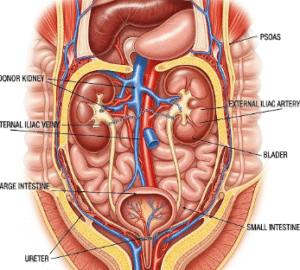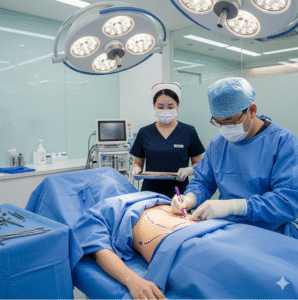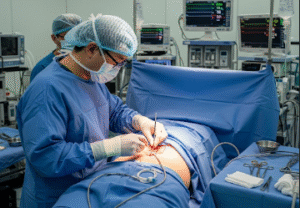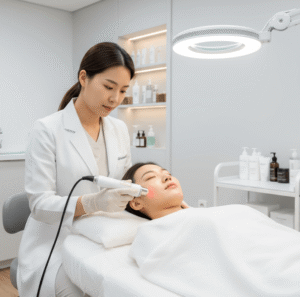What it is
- ➤ An endometrial biopsy is a procedure in which a doctor collects a small sample of tissue from the lining of the uterus (endometrium) for microscopic examination.
- ✦ The goal is to evaluate abnormal uterine bleeding, investigate infertility, or rule out precancerous/cancerous conditions.
- ➟ The test can be performed in the clinic using a thin suction tube (Pipelle) or with a curette.
- Important: This biopsy checks only the endometrium, not the cervix or ovaries.
Why it’s done
- ➤ Main reasons:
- ▪ Investigate abnormal or heavy menstrual bleeding.
- ▪ Rule out endometrial hyperplasia or endometrial cancer.
- ▪ Evaluate uterine response to hormone therapy.
- ▪ Assess fertility problems, especially recurrent miscarriages.
- ✦ Benefits:
- ✅ Provides a direct diagnosis of endometrial health.
- ✅ Detects early signs of cancer or pre-cancer.
- ✅ Helps guide treatment (hormonal therapy, surgery, etc.).
- ⟶ Limitations:
- ▪ May miss localized lesions (sampling error).
- ▪ Can be uncomfortable or painful for some patients.
- Bold takeaway: Endometrial biopsy is the gold standard for diagnosing abnormalities of the uterine lining.
Alternatives
- ➤ Transvaginal ultrasound: Shows thickness of the endometrium but cannot confirm cancer.
- ✦ Sonohysterography (saline infusion ultrasound): Improves visualization of polyps or fibroids.
- ➟ Hysteroscopy: Direct visual inspection of the uterine cavity, often with biopsy.
- Important: Imaging is useful but cannot replace biopsy for confirming cancer or precancer.
Preparation
- ➤ Schedule: Usually performed after menstruation but before ovulation for fertility cases, or anytime abnormal bleeding occurs.
- ✦ Pre-procedure instructions:
- ▪ Avoid tampons, douching, or intercourse for 24 hours before test.
- ▪ Inform your doctor about medications, especially blood thinners.
- ▪ Take an over-the-counter pain reliever (ibuprofen/paracetamol) 30–60 minutes before, to reduce cramps.
- ➟ Tell your doctor if you:
- ▪ Are pregnant or suspect pregnancy (biopsy is not performed in pregnancy).
- ▪ Have pelvic infection symptoms.
- ▪ Have bleeding disorders or low pain tolerance.
- Important: Arrange for transport if you’re prone to fainting during pelvic procedures.
How it’s done
- ➤ Step 1 – Setup: You lie on an exam table, and a speculum is inserted to view the cervix.
- ✦ Step 2 – Cervical cleaning: The cervix is gently cleaned with antiseptic.
- ➟ Step 3 – Sampling:
- ▪ A thin catheter (Pipelle) is inserted through the cervix into the uterus.
- ▪ Suction is applied to collect endometrial tissue.
- ▪ In some cases, a curette or hysteroscope is used.
- ➤ Step 4 – Collection completed: The sample is sent to the lab for pathology.
- → Duration: 5–10 minutes in most cases.
- What you feel: Cramping similar to menstrual pain; brief but sometimes intense.
Recovery
- ➤ After biopsy:
- ▪ Mild cramps and light spotting for 1–2 days are common.
- ▪ Use pads, not tampons.
- ▪ Avoid sex, tampons, and douching for 2–3 days or as advised.
- ✦ Results:
- ▪ Normal → No abnormality found.
- ▪ Endometrial hyperplasia → May need hormone therapy or minor surgery.
- ▪ Endometrial cancer → Referral to oncology for treatment.
- ⟶ Seek urgent care if:
- ➤ Heavy bleeding (soaking more than 1 pad/hour).
- ➤ Fever, chills, foul-smelling discharge.
- ➤ Severe abdominal pain unrelieved by medicine.
- Important: Always return for follow-up to review biopsy results—do not assume “no call = no problem.”
Treatment option in Korea
- ➤ Where available:
- ▪ University hospitals in Seoul, Busan, Incheon, Daegu, Gwangju, and Daejeon.
- ▪ Women’s health centers and international patient clinics.
- ✦ Why Korea:
- ▪ Modern sampling tools like Pipelle biopsy for minimal discomfort.
- ▪ Rapid pathology labs with results in a few days.
- ▪ Bilingual support staff for international patients.
- ➟ If abnormal results are found:
- ▪ Hormonal therapy (progesterone pills, IUD).
- ▪ Hysteroscopic polyp removal if benign growths are found.
- ▪ D&C (dilation and curettage) or hysterectomy for severe or malignant findings.
- ▪ Oncology team care for confirmed endometrial cancer.
- ⟶ For international patients:
- ▪ Can book one-stop gynecologic check-up packages including ultrasound, Pap smear, HPV, and biopsy.
- ▪ Expect same-day biopsy with results ready within 2–5 days.
- ▪ Reports can be issued in English for continuity of care abroad.
- Important: Korea’s integrated women’s health centers provide screening + diagnosis + treatment in one streamlined system—very efficient for both locals and medical travelers.

